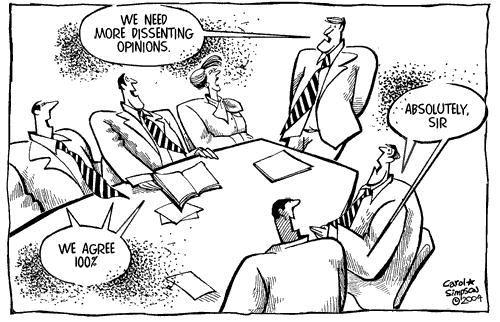Image courtesy of http://bettermontanajobs.com/the-need-for-dissent-in-innovation/
- Dislike the idea, not the person. Good people can have bad ideas and bad people can have good ideas. Believing the contrary to this is actually a logical fallacy known as "ad hominem." I disagree with my loved ones on things all the time. My parents and I have different political ideals. Is that grounds for dismissal of them form my life? Not so long as we aren't harming each other. I love my parents. I don't love some of their ideals. This isn't always simple. but it is still straight-forward.
- Instead of "us" and "them," be aware that there are more than those 2 views. Debates are rarely broken up into just two parties (although our political system would have you fooled this time of year). This actually is done for brevity sake. This stratification also insinuates that you can't have opinions that encompass or dismiss both sides because it doesn't fit in with the nomenclature being used. You are allowed to have an opinion other than the 2 options being presented to you at the moment.
- Let's just forget "us" and "them" altogether, shall we. Who are those people anyways? What dictates an "us"? How do we define "them"? These are terms used to rile you up and think there is an enemy out there that is out to get you. By creating an enemy, people in power are able to control you better by causing you to fear. (Go Google the Red Scare from the 1950's for a great example.)
- Don't get emotional. You are defending your idea; not yourself, and if the person you are speaking with is attacking you (calling names, insinuating you are below average intelligence) then to be honest, they have already lost the debate and they aren't constructive conversation. The best example of this is when The Young Turks were taken over at the RNC this week. Both groups got overtly emotional and angry and it turned into a matter than security had to address. While I am pro-TYT, they lost the debate (if you can even call it that) due to their reaction.
- You are the expert, until you aren't. Look, we've all been there. We have our perfectly formulated ideas and rebuttals, and then SMACK. Someone hits us with evidence we weren't aware of and it changes everything! Now you have some options here. You can either announce the discussion is over and leave; hear out the other party, but not actually look to understand their position; or you can ask them questions and explore that point into more depth. It's your choice, but I highly suggest the last one. What is the point of conversation if you are unable to learn something from it anyways? If you continue under your current paradigm, knowing that evidence is out there to refute your claim, you are doing yourself, as well as the scientific community a disservice. Many people see changing their opinion as "losing," but if you have learned something for free, isn't that still #winning? Take the "loss" and walk away a better person. This will help you in the long run when it comes to future debates.
- Pros and Cons are relative. There. I said it. It should be obvious, but we don't like to think that our precious morals and ethics are as greyscale at Ser Jorah Mormont (spoiler!). Let me make my point more clear: If you are debating an issue that is moral (such as not killing people), then any pros for that topic would also be moral and any cons would be immoral. Now lets make the issue an immoral one (such as murder). Now any pros for this topic are immoral and any cons are now moral. Its all about perspective, and its important to remember that.




No comments:
Post a Comment